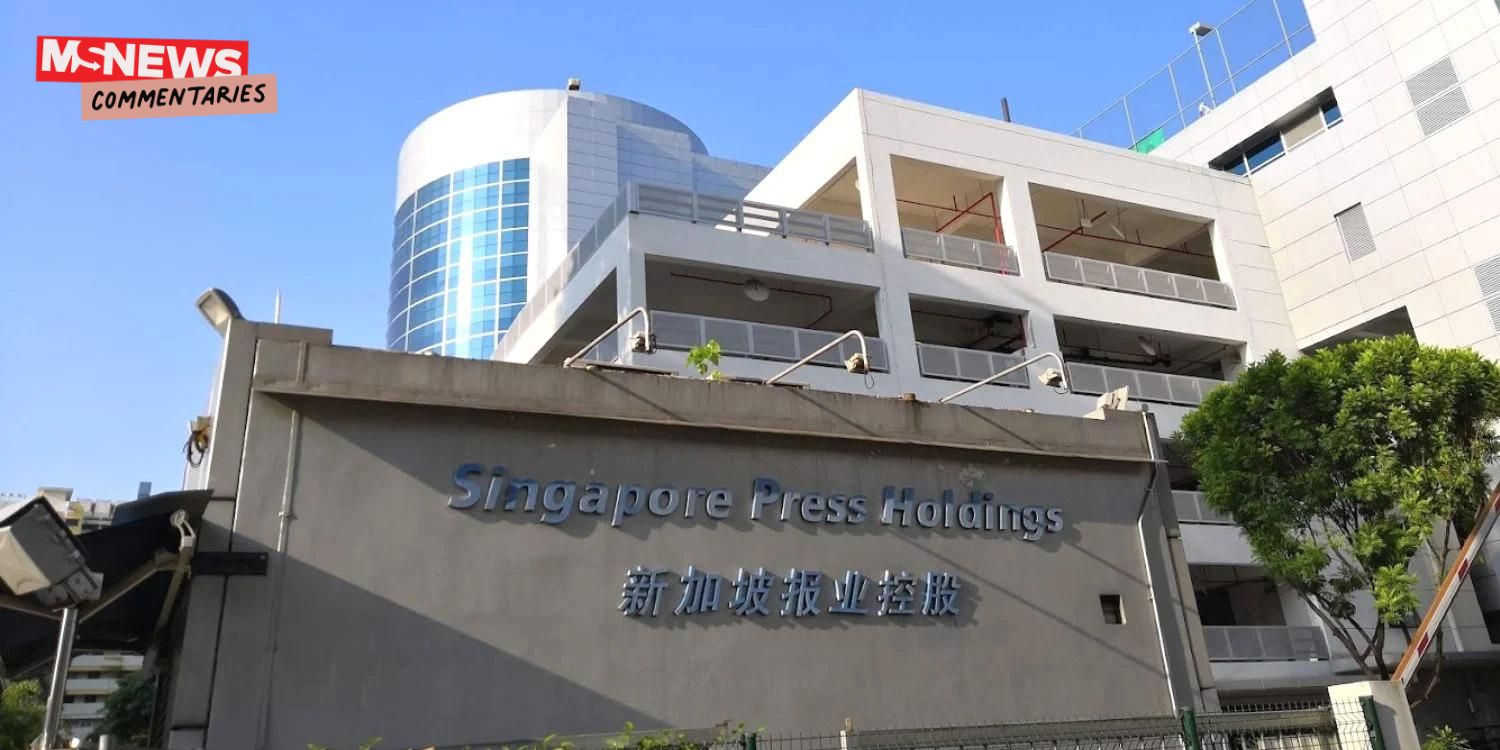SPH Media Trust’s Management Needs To Clear The Fog Surrounding It
A Facebook post from an ex-boss of mine kicked up a mini-storm on Sunday (5 Mar) about the composition of SPH Media’s senior management team.
Leslie Fong, a former Straits Times (ST) editor (with a big E), named seven people whom he said were former staffers from the IT and consultancy firm, Accenture.
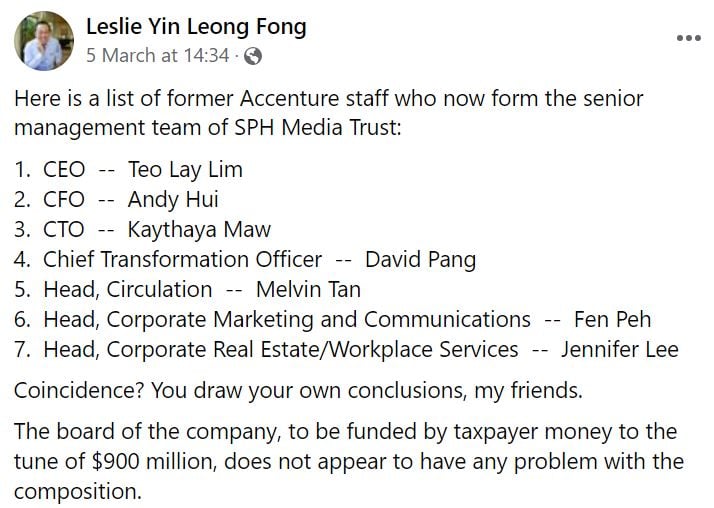
Source: Leslie Yin Leong Fong on Facebook
He wrote, “Coincidence? You draw your own conclusions, my friends.”
“The board of the company, to be funded by taxpayer money to the tune of $900 million, does not appear to have any problem with the composition.”
The natural presumption is that they were recruited by SPH Media’s Chief Executive Officer (CEO) Teo Lay Lim, the former Accenture chairperson who spent 33 years in the firm before taking on the SPHM job in March 2022.
Over the past year, her ex-colleagues appeared to have been roped in for top posts such as Chief Financial Officer (CFO), Chief Technology Officer and Chief Transformation Officer.
Leadership chart mainly comprises ex-Accenture top dogs
Fong added the names of three more individuals who assumed roles as heads of various departments, including:
- circulation
- corporate marketing and communications
- corporate real estate-workplace services
A quick check on LinkedIn shows that all had worked in Accenture at some time or other.
The exception was CFO Andy Hui, who quit last year after 11 years at the firm. He was the firm’s Southeast Asia CFO and Geographic Operations Managing Director.
Looking at the media group’s senior leadership chart on its website, only three people appear to have remained unmolested in the management re-shuffle that occurred after SPH hived off its publishing business into a nonprofit entity in 2021.

Source: SPH Media
All three are journalists designated as Editor-in-Chief of Lifestyle, as well as English, Chinese, Malay, and Tamil language publications.
One new entrant seems to have no work ties with Accenture — Joanna Ho, the Chief Commercial Officer. She has worked in various companies, including petroleum giant Shell, OCBC bank and retailer Courts.
Ex-ST editor believes greater transparency is needed
You can read many things in that intriguing post. What conclusions did Fong expect us to draw? That cronyism is being practised? That too many people cut from the same cloth would result in groupthink? That the net wasn’t cast wide enough to include at least a couple of people with media industry experience?
I asked Fong.
His reply: “The recent furore over alleged inflated newspaper circulation figures has prompted me to reflect on how SPH Media Trust is being managed as well as its public accountability. From there, one of the natural follow-up questions is: who are the people managing the company?
So I did some checking. And I posted the results on FB because I believe there should be greater transparency about a company funded by taxpayer money.
I agree with commentators who say that it is only natural for new leaders to surround themselves with people they trust. They would need good lieutenants or risk being bamboozled by people who knew more about the business than they did.
You have to assume — rightly or wrongly — that people with deep roots are not comfortable with change, and change is what is needed to transform the company to fit with the changed reading patterns, new technologies and advertising trends. A new broom, as they say, sweeps clean.
The question is how many is too many — and whether we should care.
How a nonprofit entity works is everybody’s business
Like Fong, I was also flummoxed at the management’s handling of the circulation fiasco involving inflated figures. To me, it was an example of how unprepared the new management was for the reaction that followed.
An industry veteran, for example, would realise that advertising rates are traditionally linked to circulation numbers — and make clear from the outset if this was so.
In this case, Teo had to send a belated note to advertisers declaring that there was no link. An industry veteran would also know about the value of retaining “trust” and coming clean with what had happened before it got “scooped”, like in this case.
There also seemed to have been some confusion about “double counting” of copies and whether this is a legitimate practice endorsed by newspaper companies worldwide. The management, which had felt confident enough about its case to tell some long-serving staffers to leave, now wants a more detailed audit of the numbers.
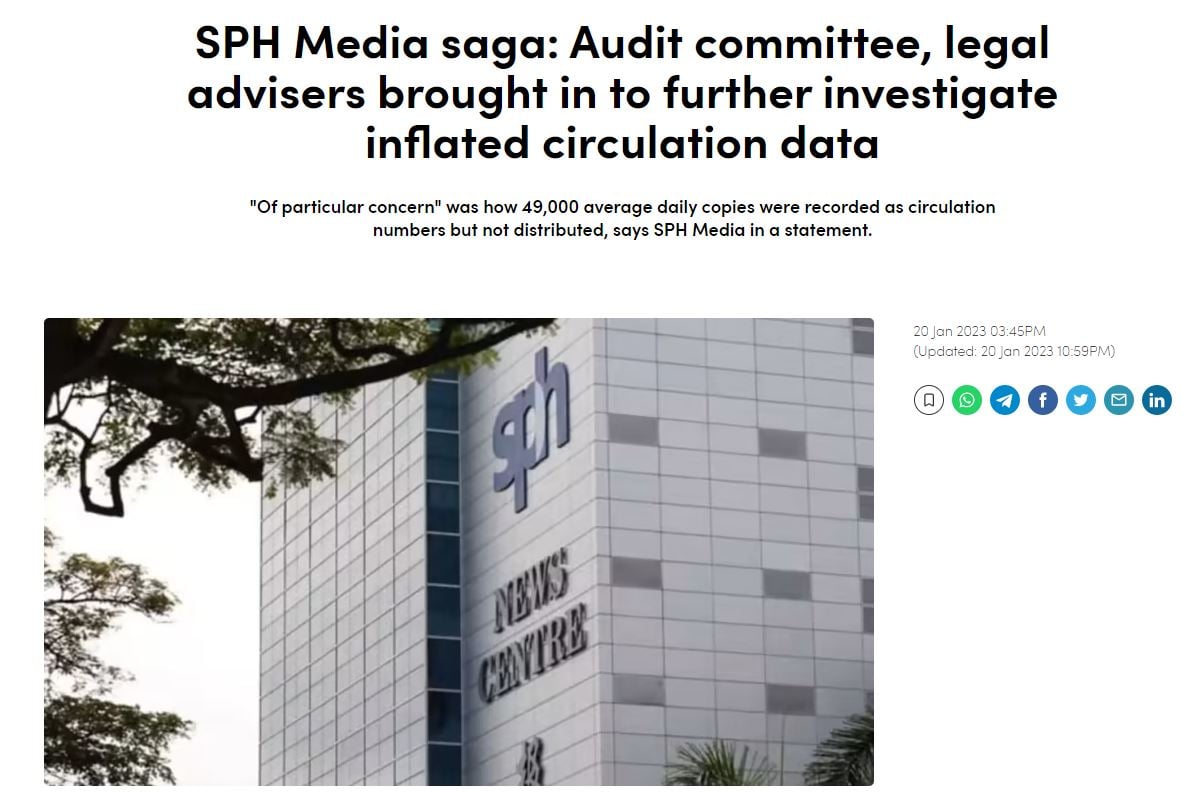
Source: CNA
If this were a private company, it would probably be nobody else’s business. Just as it’s not anybody’s business who Teo picked for management posts.
But it’s worth reminding ourselves what a nonprofit entity is and how it should operate.
Info on SPH Media Trust’s management leadership is opaque
The first principle must be transparency and accountability. Unlike a listed company with shareholders insisting on their right to know, there is no formal forum for “stakeholders” to check on a nonprofit entity.
There is the higher level board of the SPH Media Trust, but it too is shrouded in opacity.
If you look at the SPH Media website, there’s very little information on what the organisation’s members or management leadership do.
Corporate governance is down to just whistle-blowing and buying from suppliers. There is no mission statement besides “trusted source of news”. There is no statement of values. It is only because of the circulation saga that we know which board members form the audit risk committee.
In fact, SPH Media was too shy even to tell us which external auditor it used that find out about the faked figures.
We don’t know the role of the 16 institutional members of the organisation, which are the big shareholders of the old SPH. We don’t know how often the board should meet or whether there is a work plan from management.
We don’t know what sort of arms-length distance is maintained between the board and the newsrooms, or how editors are picked. We have no idea who are the various editors in the main publication, The Straits Times.
For a few months now, only two names have been represented on the masthead, the Editor-in-Chief and the Editor. That is, in my view, more damning coming from a newsroom than any inappropriate management action.
It is not as if there are no examples of media organisations running along the nonprofit route. ProPublica is funded by several foundations, while The Guardian is supported mainly by reader donations. They have corporate governance principles and are transparent about their activities.
You can check The Guardian’s code of corporate governance here.
Media organisations don’t have the luxury of time
Unlike these nonprofit entities who believe they can pursue independent journalism because they no longer have to think about making profits, the reality is that the media here wouldn’t survive without ads — and without Government largesse.
So the “profit” motive to deliver dividends to shareholders might be absent now, but SPHM has a lifeline attached to the Government of about $980 million over five years.
I had expected SPHM to be more active about sourcing funds, but there has been no sight nor sound except for some training courses for outsiders conducted by its academy. I hope that it knows that being tethered to the Government’s wallet isn’t going to improve “trust levels” with readers.
In other words, this doesn’t sound like an entity engaging its stakeholders, unless it sees the Government as the only one worth engaging with — or its own journalists. Read this, and you’ll know what I mean.
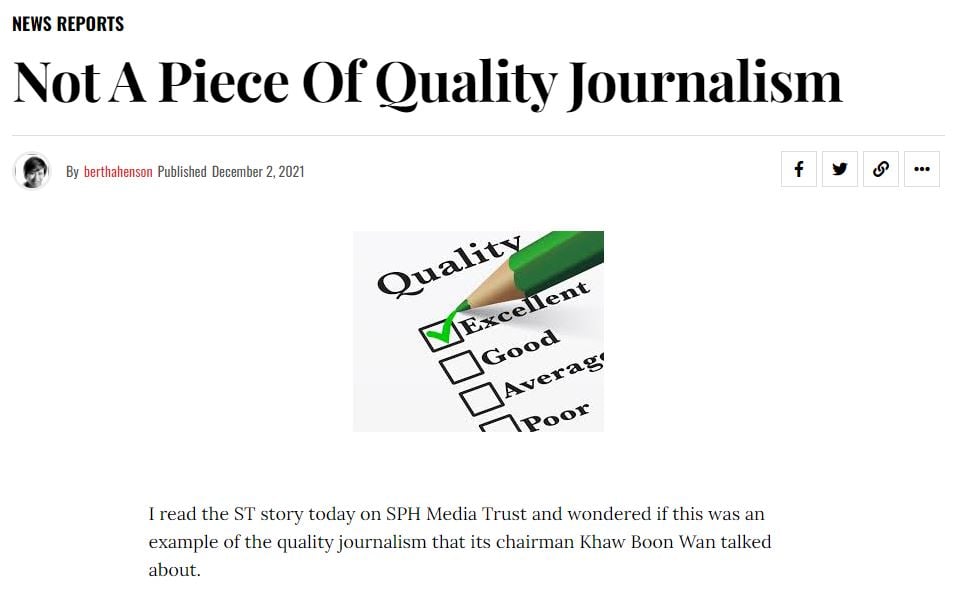
Source: Bertha Harian
I recall how enthusiastic I was when news broke of the changes to SPH in May 2021.
I said here that it presented “an opportunity for the new entity to draw up its own rules of engagement with newsmakers, donors and advertisers.”
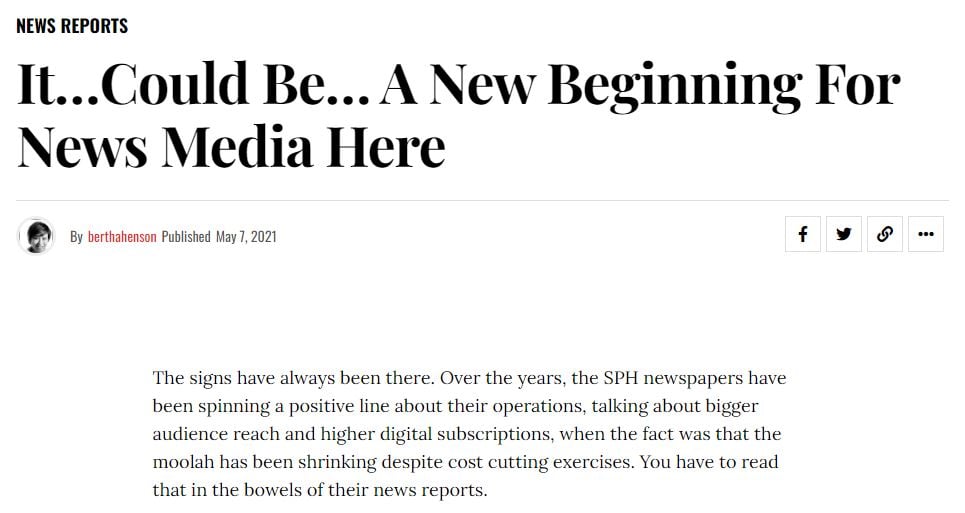
Source: Bertha Harian
“Hopefully, it will be led by those who understand the value of journalism and what it takes to raise the game. The composition of this core group would be vital to gain public credibility.”
But things have not changed — except that taxpayers’ money is footing the bill.
I know the usual response would be to give it “time”. Time is what the media doesn’t have. Things, including readers, are moving too fast. Industry veterans know full well that once a reader leaves, he never returns.
May the management of ex-Accenture alumni remember this too.
Bertha Henson, ex-journalist at SPH and media trainer, is a social media commentator on local news. She blogs at Bertha Harian.
Featured image adapted from Google Maps.
